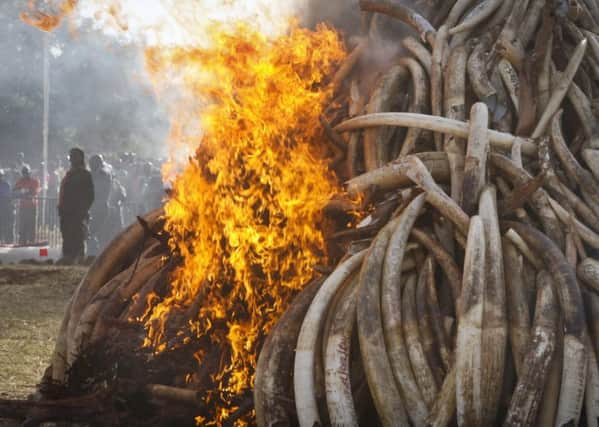Chinese pledge to ban ivory trade hailed


China’s vast and increasingly affluent consumer market is seen as a major driver in elephant poaching across Africa.
The ban could happen in 2017 when a legal stockpile of ivory in China is possibly depleted, predicted Zhou Fei, head of the China office of Traffic, a wildlife trade monitoring organisation.
Advertisement
Hide AdAdvertisement
Hide AdHe said he is encouraged by the political will of China’s top leadership to combat poaching that, by some estimates, has killed more than 100,000 African elephants in the past few years and prompted governments to publicly destroy confiscated ivory in major cities, including New York last week.
The comment by Zhao Shucong, head of China’s State Forestry Administration, came at a Beijing event in which 1,455 pounds of ivory were crushed, rendering tusks, carved statues and other ornaments useless for sale.
“Under the legal framework of Cites and domestic laws and regulations, we will strictly control ivory processing and trade until the commercial processing and sale of ivory and its products are eventually halted,” Zhao said.
Cites is the Convention on International Trade in Endangered Species of Wild Fauna and Flora, which seeks to regulate the multi-billion dollar trade in wild animals and plants.
China allows trade in ivory acquired before a 1989 Cites ban and from a Cites-approved purchase by China and Japan of an ivory stockpile from several African countries in 2008. Conservation groups say China’s illegal trade has since flourished.
“The fact that China is now talking about shutting down its own market could be huge,” said Ginette Hemley, senior vice-president of wildlife conservation at the World Wildlife Fund.
Ms Hemley said, though, that a total ban was not “something that can happen overnight” and that it should be implemented carefully to prevent criminal groups funneling as much ivory as possible through the legal system before it ends.
In his speech, Zhao referred to an ivory trade ban as the seventh of ten “major measures” on wildlife conservation, including tougher law enforcement and publicity campaigns aimed at Chinese abroad. The State Forestry Administration has relatively limited resources and would require the support of multiple Chinese government agencies to enforce a ban.
Advertisement
Hide AdAdvertisement
Hide AdChina has backed an ivory-carving industry as part of its cultural heritage, and Zhao did not say whether that industry, a valuable source of jobs, would also end.
Zhou said he is confident about his 2017 prediction because he heard more encouraging comments from Zhao at a meeting last week on an anti-poaching operation dubbed Cobra III that netted several hundred arrests across Asia, Africa and Europe. Zhou said other factors influencing China as it considers an ivory trade ban are international pressure and “the benefit of legal trade vs damage of illegal trade to China.”
In February, China announced a one-year ban on ivory imports. Pan Peng, a spokeswoman for the Chinese Embassy in South Africa, described the step as an “experimental approach” to gauge its effectiveness in countering the illegal trade. China has also said it cannot singlehandedly act against the ivory trade.